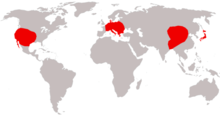Amynodontidae
| Amynodontidae Temporal range: Late Eocene–Early Miocene | |
|---|---|
| | |
| Gigantamynodon, Metamynodon, Cadurcodon | |
| Scientific classification | |
| Kingdom: | Animalia |
| Phylum: | Chordata |
| Class: | Mammalia |
| Order: | Perissodactyla |
| Family: | †Amynodontidae |
| Genera[1] | |
|
see text | |
 | |
| Range of Amynodontidae based on fossil record | |

Zaisanamynodon protheroi
Amynodontidae ("threatening tooth")[2] is a family of extinct perissodactyls related to true rhinoceroses, they are commonly portrayed as semiaquatic hippo-like rhinos[3][4] but this description only fits members of the Metamynodontini, other groups of amynodonts like the cadurcodontines had more typical ungulate proportions and convergently evolved a tapir-like proboscis. Their fossils have been found in North America, Europe and Asia ranging in age from the Middle Eocene to the early Oligocene, with a single genus (Cadurcotherium) surviving into the Early Miocene in Asia.[5]
Taxonomy
†Amynodontidae
- Subfamily Amynodontinae
- Tribe Cadurcodontini
- Genus Cadurcodon
- Genus Lushiamynodon
- Genus Sharamynodon
- Genus Sianodon
- Tribe Metamynodontini
- Genus Gigantamynodon
- Genus Metamynodon
- Genus Paramynodon
- Genus Zaisanamynodon
- Tribe incertae sedis
- Genus Amynodon
- Tribe Cadurcodontini
- Subfamily incertae sedis
- Genus Amynodontopsis
- Genus Armania
- Genus Cadurcamynodon
- Genus Cadurcopsis
- Genus Cadurcotherium
- Genus Caenolophus
- Genus Euryodon
- Genus Hypsamynodon
- Genus Megalamynodon
- Genus Mesamynodon
- Genus Penetrigonias
- Genus Procadurcodon
- Genus Rostriamynodon
- Genus Teilhardia
- Genus Toxotherium
References
- ↑ McKenna, M. C, and S. K. Bell (1997). Classification of Mammals Above the Species Level. Columbia University Press. ISBN 0-231-11012-X.
- ↑ American Museum of Natural History, "Perissodactyls Glossary"
- ↑ Savage, RJG, & Long, MR (1986). Mammal Evolution: an illustrated guide. New York: Facts on File. p. 194. ISBN 0-8160-1194-X.
- ↑ Palmer, D., ed. (1999). The Marshall Illustrated Encyclopedia of Dinosaurs and Prehistoric Animals. London: Marshall Editions. p. 264. ISBN 1-84028-152-9.
- ↑ Wall, William P. (1989). "The phylogenetic history and adaptive radiation of the Amynodontidae". In Prothero, Donald R; Schoch, Robert M. The Evolution of perissodactyls. Oxford University Press. ISBN 9780195060393.
This article is issued from Wikipedia - version of the Wednesday, September 30, 2015. The text is available under the Creative Commons Attribution/Share Alike but additional terms may apply for the media files.
